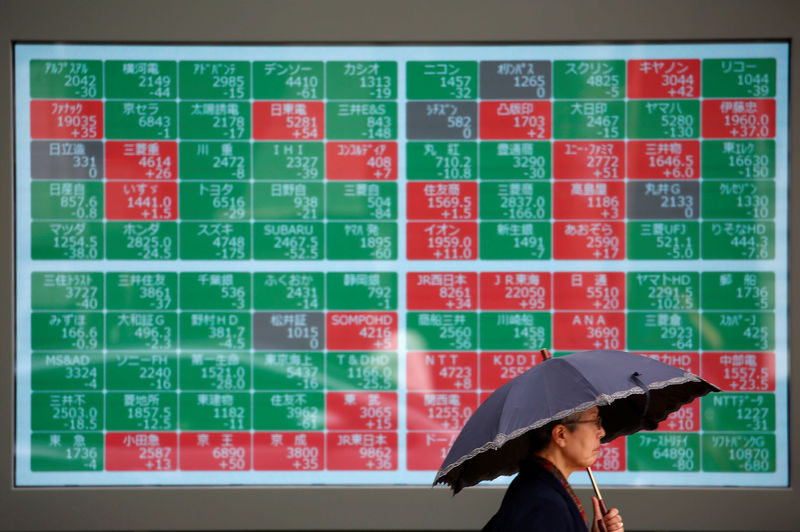By Marc Jones and Wayne Cole
LONDON/SYDNEY (Reuters) - Stocks rallied and bonds retreated on Monday as the United States and China agreed to restart trade talks, leading investors to pare wagers on aggressive policy easing by the major central banks.
The dollar firmed on the safe-haven yen as Treasury yields rose and futures reined in bets for a half-point rate cut from the U.S. Federal Reserve this month.
"It (Trump-Xi G20 meeting) played as well as possible," said SEB Investment Management's global head of asset allocation Hans Peterson. "So It gives us time to digest and get a bit better activity in the global economy."
The United States and China agreed on Saturday to resume trade negotiations after President Donald Trump offered concessions to his Chinese counterpart Xi Jinping when the two met at the sidelines of the G20 summit in Japan.
These included no new tariffs and an easing of restrictions on tech company Huawei [HWT.UL] in order to reduce tensions with Beijing. China agreed to make unspecified new purchases of U.S. farm products and return to the negotiating table.
The initial reaction was one of relief that at least new tariffs were avoided.
Europe's STOXX 600 and Japan's Nikkei (N225) climbed 1% and 2.1% respectively to hit two-month tops and MSCI's broadest global index (MIWD00000PUS) added 0.2% having only just missed out on its best first half to a year.
Chinese blue chips (CSI300) jumped 2.6% to their highest since late April, Germany's export-heavy DAX (GDAXI) sprang 1.5% to its highest since August, Wall Street futures were up over 1% while the combination of the Huawei hiatus and M&A activity hoisted Europe's the tech sector (SX8P) to a one-year high.
E-Mini futures for the S&P 500 (ESc1) and Nasdaq (NQc1) rose 1.1% and 1.7% each too whereas in the bond market Treasury futures (TYc1) slid 10 ticks as yields on 10-year notes (US10YT=RR) edged up 4 basis points to 2.04%. [GVD/EUR][.N]
Fed funds <0#FF:> dropped over 5 ticks as the market scaled back the probability of a half-point rate cut this month to around 15%, from nearer 50% a week ago.
"I think the Fed expectations in the market are very aggressive. Possibly a bit too aggressive," SEB's Peterson added.
DAMAGE DONE
Yet, no deadline was set for a trade deal and much damage has already been done, with two surveys of Chinese manufacturing showing activity contracting.
The official Purchasing Managers' Index (PMI) held at 49.4 in June, just missing forecasts, while the Caixin/Markit PMI dropped to 49.4, the worst reading since January.
Surveys from Japan and South Korea showed similar slowdowns as did the 19-country euro zone's reading which contracted for fifth month running and at a faster pace than previously thought.
"Euro zone manufacturing remained stuck firmly in a steep downturn in June, continuing to contract at one of the steepest rates seen for over six years," said Chris Williamson, chief business economist at IHS Markit.
"The disappointing survey rounds off a second quarter in which the average PMI reading was the lowest since the opening months of 2013."
The reaction in currency markets was to strip some recent gains from safe harbors like the yen and Swiss franc. The dollar crept up 0.4% on the yen to 108.26
The dollar added 0.4% on a basket of currencies to 96.531 (DXY), while the euro eased to $1.1328 (EUR=). The dollar went the other way on the Chinese yuan, dipping 0.4% to 6.8403
The dollar's gains took some of the shine off gold, which fell 1.5% to $1,388 per ounce
Oil prices sprang higher on news OPEC and its allies look set to extend supply cuts at least until the end of 2019 as Iraq joined top producers Saudi Arabia and Russia in endorsing the policy. [O/R]

Brent crude (LCOc1) futures rose $1.85 or 2.8% to $66.40, while U.S. crude (CLc1) gained $1.84 or 2.75% to $59.90 a barrel.